You’ve got momentum — just maybe not the money to match.
Grants can help, but finding the right one (and applying for it) is another story.
You shouldn’t need a government translator or ten tabs open to figure out if you qualify.
This guide does the heavy lifting for you. We’ll show you where to look in the UK and US, how to determine if a grant is worth your time, and what it really takes to secure the funding.
What are small business grants?
Small business grants are funds you don’t have to repay — no interest or equity, just free capital with a purpose. They usually come from governments or large organizations aiming to boost specific goals, like job creation or supporting underrepresented founders.
Each grant has its own rules. Some target specific industries. Others are for women or minority-owned businesses. A few are open to anyone with a strong plan. What matters most: showing how you’ll use the money and what impact it’ll make.
Benefits of small business grants
They support faster growth
Access to financing is a top concern for small businesses, with 68% of owners saying it’s the most important factor for growth. A grant can cover costs like marketing, equipment, or expansion, exactly when you need it.
They reduce financial pressure
Unlike loans, grants don’t require repayment. That means you can invest in development, staffing, or tools without increasing your debt or monthly expenses.
They strengthen your credibility
Securing a grant shows your idea holds weight. It proves your project meets high standards, which can help with future funding, partnerships, or press.
They back meaningful work
Many grants are tied to specific goals like sustainability, inclusion, or innovation. If your business aligns, it’s a chance to fund something valuable and build long-term impact.
Types and examples of small business grants
1. Government grants (federal, state, and local)
Government grants are offered by public agencies to support small businesses driving economic growth, innovation, or community impact. These programs exist at the federal, state, and local levels, each with different eligibility and funding criteria.
- United Kingdom: Innovate UK offers Smart Grants for commercially viable R&D projects with the potential to boost the UK economy.
- United States: Programs like SBIR (Small Business Innovation Research) and STTR (Small Business Technology Transfer) fund early-stage tech development with strong commercialization potential.
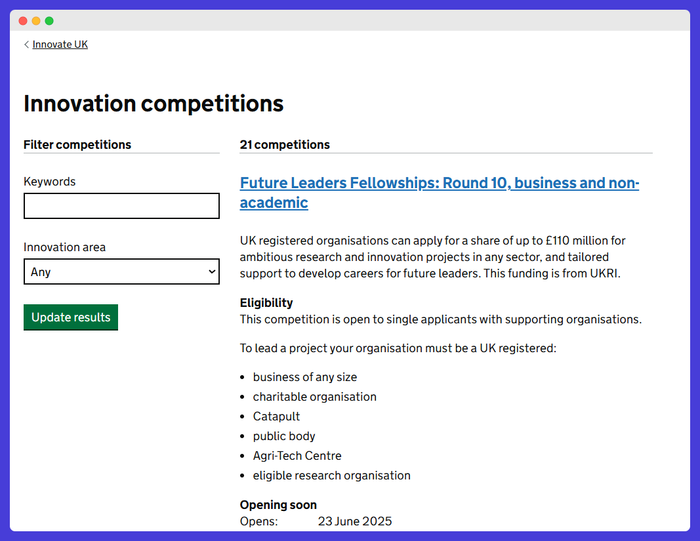
Pros:
- Access to large-scale funding opportunities. Grants can range from tens of thousands to multi-million-pound or dollar investments, depending on your project and sector.
- Increases your business’s credibility with government recognition. Winning a government grant signals that your idea meets strict public-sector standards, often opening doors with investors, partners, and media.
Cons:
- Highly competitive and time-consuming application process. Expect a multi-stage process with strict deadlines, detailed proposals, and rigorous reviews — especially for innovation-focused grants.
- Involves detailed reporting, strict criteria, and ongoing compliance. You'll need to track how every pound or dollar is spent, meet milestones, and stay aligned with the grant’s original goals to avoid penalties or clawbacks.
2. Corporate and private grants
These grants are offered by corporations or private foundations looking to support small businesses as part of their corporate social responsibility (CSR) efforts or community investment strategies.
- United States: U.S. Business Grants provides funding to small businesses to help fuel their growth and innovation.
- United Kingdom: Enterprise Nation, in partnership with VistaPrint, launched the 'Realising the Remarkable' program, offering grants to help UK-based small businesses grow sustainably.
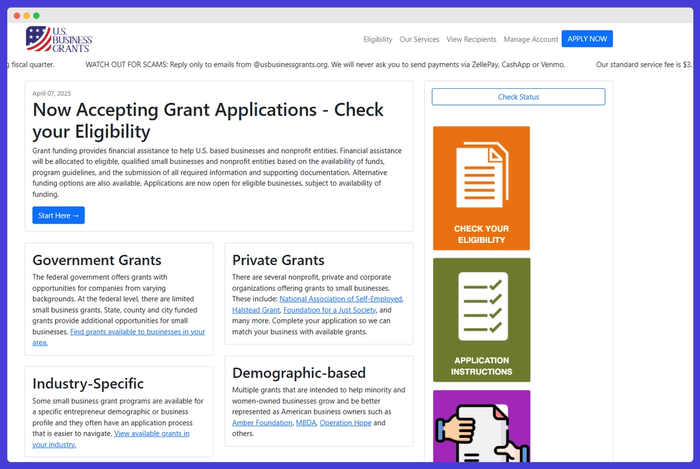
Pros:
- Potential for additional support such as mentorship and networking opportunities. Many corporate grant programs come with added perks like coaching, exposure, or access to exclusive business communities.
- Less bureaucratic application processes compared to government grants. Applications are often simpler and faster, with fewer reporting requirements and more emphasis on storytelling or brand alignment.
Cons:
- May require alignment with the company’s brand or mission. Your business values, product, or audience might need to closely match the grant provider’s CSR goals or marketing focus.
- Often involve public voting or promotional activities as part of the selection process. Some programs use visibility-based selection (e.g., social media votes), which can be unpredictable or favor well-connected applicants.
3. Demographic or niche grants
These grants are designed to support entrepreneurs from specific backgrounds or industries, such as women, minority groups, or youth founders. They help level the playing field and offer tailored support to underrepresented or mission-aligned businesses.
- Women entrepreneurs: The Amber Grant awards $10,000 each month to women-owned businesses in the U.S., with an additional $25,000 annual grant awarded to one of the monthly winners.
- Young entrepreneurs: The Prince’s Trust Enterprise Programme in the UK supports individuals aged 18 to 30 with startup funding, training, and ongoing mentorship to help turn their ideas into viable businesses.

Pros:
- Tailored support addressing specific challenges faced by the target group. These grants often come with mentorship, community access, or learning resources built specifically for your stage or situation.
- Opportunities to connect with peers and mentors within the same demographic or industry. They can plug you into networks that understand your challenges, and that can lead to collaboration or referrals.
Cons:
- Limited to applicants who meet specific eligibility criteria. You’ll need to show proof of age, identity, or business ownership to qualify, and some grants may also require evidence of impact.
- Funding amounts may be smaller compared to broader grant programs. While valuable, these grants often award smaller sums or support fewer recipients per cycle.
4. Local or community grants
Sponsored by local councils, chambers of commerce, or regional initiatives, these grants aim to grow the local economy by supporting small businesses that improve their communities, from revitalizing high streets to creating local jobs.
In the UK, Elmbridge Borough Council’s Business Boost Grants help fund projects that benefit the local economy, like shopfront upgrades, digital improvements, or reopening vacant retail spaces.
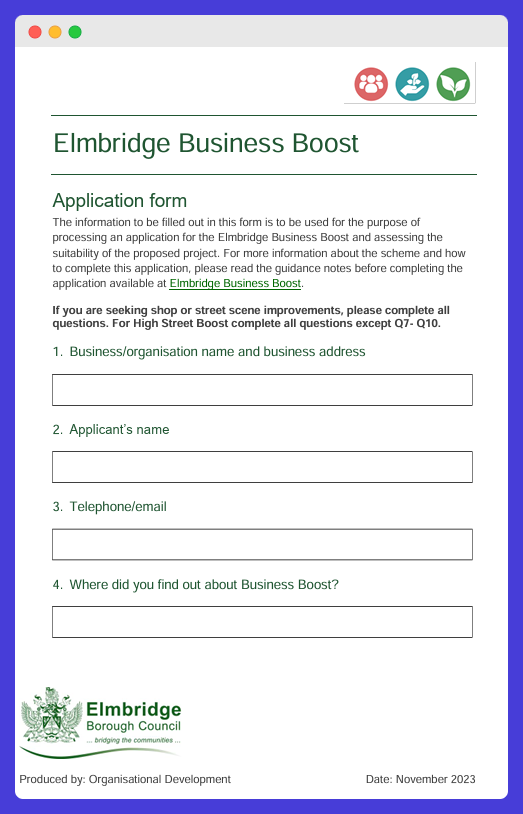
Pros:
- Lower competition due to local focus. Fewer applicants means a higher chance of success, especially if your project has a visible impact in the area.
- It’s designed to stimulate community development and economic growth. Many of these grants aim to create a ripple effect — your win is also a win for your neighborhood.
Cons:
- Grant amounts are often modest. They’re ideal for specific, short-term improvements, not large-scale growth plans.
- Strict eligibility based on business location. You’ll need to operate within the council’s jurisdiction to qualify and be able to prove the local impact of your proposal.
Tip: Start with your local council or business support office — they often list active grants and can help with the application process.
How to find small business grants
Forget cold-calling town halls or refreshing 20 websites. These steps are how real small business owners track down funding that actually fits their goals.
1. Start with official grant databases
- U.S.: Grants.gov lets you filter by business type, location, or agency. It’s the main hub for all federal programs. For more specific help, check the SBA (Small Business Administration) site — especially if you’re in tech, research, or exporting.
- U.K.: Use the Find a Grant portal on GOV.UK. It updates frequently and includes national and regional options. Pair this with your Local Enterprise Partnership (LEP) or Growth Hub — they often have microgrants that most business owners miss.
Example: The West of England Combined Authority offers Green Business Grants of up to £15,000 to help SMEs invest in low-carbon tech and energy efficiency, like sustainable packaging or electric delivery vehicles. Similarly, Horsham District’s Green LEAP gives up to £5,000 for climate-friendly projects. Past winners like Tottington Manor used it to improve their sustainability footprint.
2. Follow reliable trackers
Not every grant is listed in one place. But these sites do a great job of keeping up:
- NerdWallet has regularly updated lists of active grant programs for U.S., U.K., and Canadian founders.
- The U.S. Chamber of Commerce publishes free funding roundups, often with links to state-level programs and deadlines.
- Enterprise Nation (UK) frequently shares new small business funding rounds, especially from private sponsors.
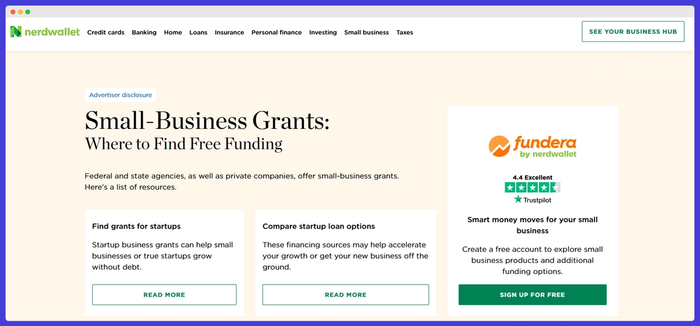
Tip: Set Google Alerts for '[your region] + small business grants' — you’ll get notified the moment new pages go live.
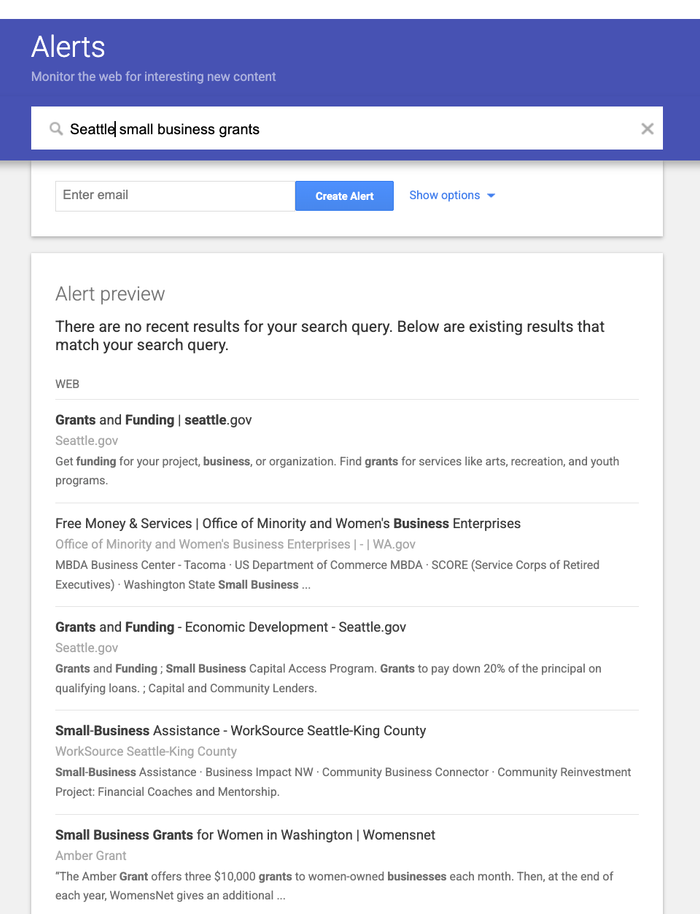
3. Tap into local community resources
Community-level grants often come with lower competition and faster decision times:
- U.S.: Your SBDC (Small Business Development Center) can help write grant applications, or tell you what you qualify for right now.
- U.K.: Reach out to economic development teams within your council or region.
4. Network within your community
The grant you need might never be advertised widely.
- Join Facebook or Slack groups for founders in your sector or city — these are goldmines for niche funding tips. On Facebook alone, there are multiple groups for people looking for grants for their small business.
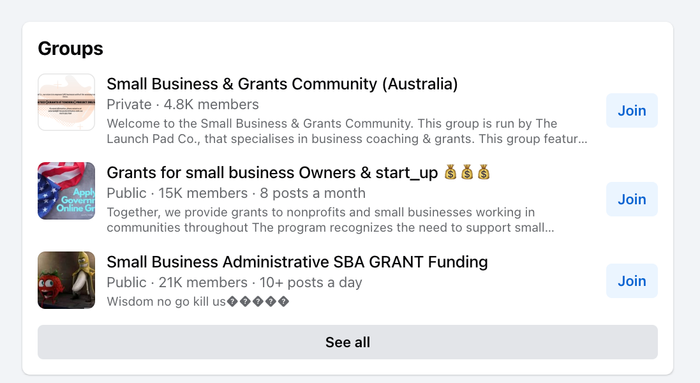
- Talk to other small business owners or mentors. Word-of-mouth often beats Google.
- Sign up for mailing lists from accelerators or industry bodies — they often share pre-release info about grants.
- Watch for local 'Pitch Nights' or 'Business Boost' competitions with cash awards. These often fly under the radar but offer quick, no-strings-attached funding. And even if there’s no prize announced? Go anyway. You never know who’s in the room — many founders have secured private backing or grant referrals just by showing up, talking, and asking the right question over coffee.
Small business grant application basics
Grants are free money, but they’re not easy money. In fact, fewer than 10% of applications are successful, according to the British Business Bank.
That means your strategy matters just as much as your idea.
Before you get into the paperwork, make sure you understand how the process works, what funders expect, and how to make your business stand out. Here’s what to know before you apply:
1. Checking the eligibility criteria
Most grants are designed with a very specific type of business in mind. Missing just one eligibility detail can mean your application is disregarded, no matter how strong the rest may be.
Here’s what typically matters:
- Business size and structure → Some programs are only open to micro-businesses, sole traders, or registered limited companies. Check your status matches the criteria.
- Location → Grants often target defined regions. For example, Elmbridge Borough Council’s Business Boost Grant is limited to businesses physically operating within that local area.
- Use of funds → You’ll likely need a clear plan. Whether it’s launching a new product, cutting emissions, or supporting your local community, the grant provider will want specifics.
- Ownership profile → Many grants are aimed at supporting women entrepreneurs, minority-led businesses, or veterans. If that’s you, highlight it early.
💡 Review the eligibility section carefully and look for must-haves or exclusions (e.g. 'must have a business bank account' or 'not open to non-profits'). If it’s not the right fit, save time and move on — there are other opportunities worth your energy.
2. Collecting the documentation
Applying for a grant often feels like preparing for a funding audit, because in some ways, it is. To compete, you’ll need to prove both your credibility and your potential.
That starts with having the right documents ready:
- Business plan → This should clearly explain your business model, target market, team structure, and future vision. For instance, if you’re applying for a green business grant, include how your project reduces carbon emissions.
- Financial statements → Lenders and grantors alike want to see stability. Prepare balance sheets and profit & loss statements from the past 12–24 months. If you’re a startup, include projected revenue and related assumptions (e.g. based on pilot sales).
- Tax returns → Most public and private grants will ask for the last 2–3 years of tax filings. For sole traders, this might mean personal returns; for limited companies, you’ll need company tax records.
- Project proposal → If you’re seeking funds for a specific initiative, such as launching a new product or hiring locally, outline the scope, timeline, key milestones, and budget breakdown. Be clear on how the money will be used and what impact it will have.
- Legal documents → These could include your business registration certificate, Articles of Incorporation, licenses, or intellectual property filings. If you're applying for a niche grant, like those supporting tech or manufacturing, a patent application or provisional IP statement may strengthen your case.
- Proof of eligibility → If you're applying for grants based on founder status or business type, attach your certification or supporting documents.
💡 Create a shared folder or dashboard with all your key documents and update it quarterly. This makes future applications much quicker and helps you spot gaps before a grant deadline hits.
3. Tips for writing a strong application
Once you’ve confirmed your eligibility and gathered your documents, the next step is making your application stand out.
Here’s how to give reviewers a reason to say yes:
- Tailor your proposal → Don’t copy-paste. Read the funder’s mission and priorities carefully, then reflect them in your language. Why you? Why this business? Why now? A generic story won’t cut it — show how your business directly helps the funder meet their goals.
❌ Bad:'We’re excited to apply for your funding. Our business offers high-quality products to a wide audience.' (Too vague. No link to the funder’s mission.)
✅ Better:'Your grant supports local job creation — our project will train and hire three people in our underserved neighborhood within six months.' (Specific, aligned, and measurable.)
- Start local if you can → City- or region-specific grants usually have fewer applicants. You’ll face less competition, and the reviewers may already know your business. Even if the funding is modest, it can build credibility for applying to larger programs later.
❌ Bad:'We’re applying for national grants to grow our customer base.' (Skips over regional options and offers no local context.)
✅ Better:'We’re applying to the West Midlands Growth Hub grant to fund a pop-up shop in Birmingham, creating foot traffic and local hiring.' (Directly refers to regional economic impact.)
- Make the impact clear → Whether you're planning to hire locally, reduce waste, or develop something novel, say it directly. Tie your project to measurable outcomes, like jobs created, emissions reduced, or underserved groups supported.
❌ Bad:'We hope this grant will help us grow and improve our business.' (Everyone wants to grow. That’s not a unique or clear outcome.)
✅ Better: 'This funding will allow us to expand our packaging line using compostable materials, reducing plastic use by 60% in 12 months.' (Concrete result + timeline = impact.)
- Back your application with real numbers → If you’re aiming for growth, show how. 'We expect to double production and hire two new staff by Q4' says more than a vague promise. Quantifying outcomes shows you’ve done your homework — and helps funders trust you’ll follow through.
❌ Bad:'With this grant, we aim to significantly increase production and hire more staff.' (What does ‘significantly’ mean? How many staff? By when?)
✅ Better:'The £10,000 grant would allow us to invest in a second machine, doubling production and creating two part-time jobs by Q3.' (Grounded in data and timelines.)
- Use plain, confident language → Avoid filler and buzzwords — clarity beats corporate speak every time. Think of your application like a pitch: clear, honest, and direct. The reviewer might not know your industry well, so aim for language anyone can understand. Also, ask someone outside your company to read it and flag unclear parts. Typos and awkward sentences can undermine your credibility, even if your idea is strong.
❌ Bad:'We aim to synergistically align strategic market deliverables to achieve elevated stakeholder engagement.' *(...what?)
✅ Better:'We want to increase customer retention through a simple loyalty program built into our POS system.' (Clear and confident)
Conclusion
Getting a small business grant takes effort, but it’s effort that opens doors. Even one small win can give you the resources (and validation) to take your next big leap.
Start simple. Choose one grant from this guide and apply. The sooner you put yourself forward, the closer you are to securing the funding your business deserves. Good luck!
FAQs
No. Small business grants are non-repayable funds awarded to support specific initiatives, typically by government agencies or nonprofit organizations. However, recipients are required to meet the grant’s terms. Misuse of funds or failure to comply with reporting requirements may result in repayment obligations or other penalties. Always review the conditions carefully.
Yes, although startup-specific grants are limited and often highly competitive. These programs usually focus on innovation, research, or supporting underrepresented groups. For example, in the UK, The King’s Trust offers funding for young entrepreneurs. In the U.S., programs like SBIR and STTR provide early-stage capital for science- or technology-driven ventures.
Begin with official government sources. In the United Kingdom, the GOV.UK Business Finance and Support Finder provides a central hub for both national and local opportunities. In the United States, Grants.gov lists federal grant programs, while the U.S. Small Business Administration (SBA) offers additional guidance and support. It's also worth checking your local council or economic development agency’s website for region-specific funding initiatives.
While no grant is guaranteed, some may be easier to get due to lower competition or narrower focus. Community-based or industry-specific grants, as well as those offered by local councils or development agencies, are often more accessible, particularly when your business objectives closely align with the funder’s mission.



![Business statistics every business owner should know [2026]](https://cdn.sanity.io/images/poftgen7/production/5619faf6a65f53406d3e554c11c9e894402d4397-5760x3240.jpg?rect=5,0,5751,3240&w=300&h=169&q=75&fit=max&auto=format)
